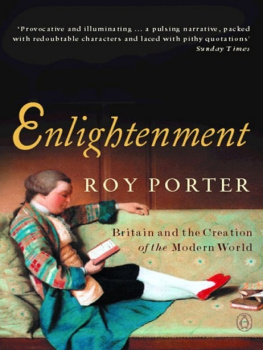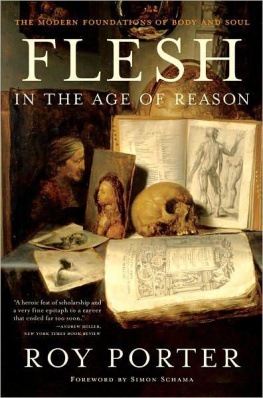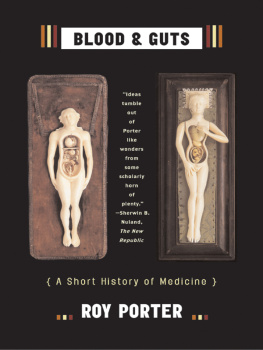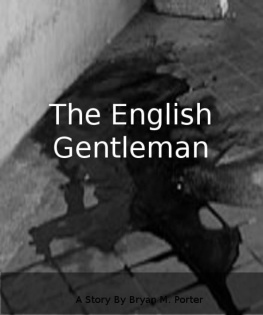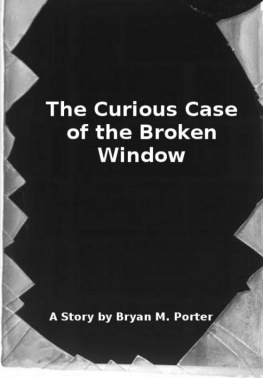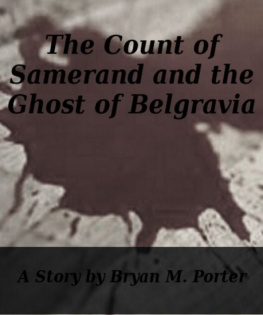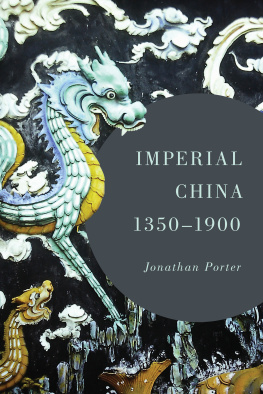PENGUIN BOOKS
ENLIGHTENMENT
He has written a stimulating book which will restore the role of Britain in the Enlightenment. What is more, he has written it in a style that is eminently readable, bubbling over with quotes and ideas, in the true spirit of the movement itself. Voltaire would have approved both of the style and the message, and there can be no higher praise than that Hugh Gough, Irish Times
Magisterial It is in one sense an enlightened text itself, a tribute to progress and to happiness Peter Ackroyd, The Times
First and foremost an intellectual history, with sharp portraits of scores of thinkers and ideas. What is different and refreshing is that Porter sticks them properly back into a mucky, argumentative but optimistic society which seems, in its grand sweep and fine detail, all too recognizable today Andrew Marr, Daily Telegraph
Brilliant This is a remarkably rich book that carries its length and impressive learning with great style. It is good to have the Enlightenment's liberating virtues so emphatically insisted upon Linda Colley, Financial Times
Porter here provides a convincing master narrative of an unfolding English Enlightenment Along the way, he paints a vivid panorama of the social underpinnings: the world of print culture, press freedom, religious toleration, educational reform and practical improvement Colin Kidd, London Review of Books
Porter's Enlightenment has been long in the making and has been worth waiting for after this book, it will be a perverse, highly partisan ideologist who would continue to deny the existence and the strength of the British Enlightenment Peter Gay, The Times Literary Supplement
ABOUT THE AUTHOR
Dr Roy Porter is Professor in the Social History of Medicine at the Wellcome Institute for the History of Medicine, London. Recent books include Mind Forg'd Manacles: Madness in England from the Restoration to the Regency (Athlone, 1987; Penguin 1990); A Social History of Madness (Weidenfeld and Nicolson, 1987); In Sickness and in Health: The British Experience 16501850 (Fourth Estate, 1988) and Patient's Progress (Polity, 1989), both co-authored with Dorothy Porter; Health for Sale: Quackery in England 16601850 (Manchester University Press); Doctor of Society: Thomas Beddoes and the Sick Trade in Late Enlightenment England (Routledge, 1991); London: A Social History (Penguin, 1996; new edition, 2000); The History of Bethlem (Routledge, 1997), co-authored; The Greatest Benefit to Mankind: A Medical History of Humanity (HarperCollins, 1997); and Gout: The Patrician Malady (Yale University Press, 1998), co-authored. He has also edited, with Jeremy Black, The Penguin Dictionary of Eighteenth-Century History. Enlightenment: Britain and the Creation of the Modern World won a Wolfson Literary Award for History for 2000.
ENLIGHTENMENT
Britain and the Creation of the Modern World
ROY PORTER

PENGUIN BOOKS
To Natsu, the love of my life
PENGUIN BOOKS
Published by the Penguin Group
Penguin Books Ltd, 80 Strand, London WC2R 0RL, England
Penguin Putnam Inc., 375 Hudson Street, New York, New York 10014, USA
Penguin Books Australia Ltd, 250 Camberwell Road, Camberwell, Victoria 3124, Australia
Penguin Books Canada Ltd, 10 Alcorn Avenue, Toronto, Ontario, Canada M4V 3B2
Penguin Books India (P) Ltd, 11 Community Centre, Panchsheel Park, New Delhi 110 017, India
Penguin Books (NZ) Ltd, Cnr Rosedale and Airborne Roads, Albany, Auckland, New Zealand
Penguin Books (South Africa) (Pty) Ltd, 24 Sturdee Avenue, Rosebank 2196, South Africa
Penguin Books Ltd, Registered Offices: 80 Strand, London WC2R 0RL, England
www.penguin.com
First published by Allen Lane The Penguin Press 2000
Published in Penguin Books 2001
Copyright Roy Porter, 2000
All rights reserved
The moral right of the author has been asserted
Except in the United States of America, this book is sold subject to the condition that it shall not, by way of trade or otherwise, be lent, re-sold, hired out, or otherwise circulated without the publisher's prior consent in any form of binding or cover other than that in which it is published and without a similar condition including this condition being imposed on the subsequent purchaser
ISBN: 978-0-14-192772-5
CONTENTS
LIST OF ILLUSTRATIONS
(Photographic acknowledgements in brackets, where applicable)
of the Structure of the Human Body with that of a Tiger and a Common Fowl, 17951806, in the Yale Center for British Art, Paul Mellon Collection, New Haven (photo: The Bridgeman Art Library)
ACKNOWLEDGEMENTS
M y interest in the Enlightenment stems from the time when, as a member of the proverbial class of '68, I had the great good fortune to be taught by Jack Plumb and Quentin Skinner at Christ's College, Cambridge. Jack showed me that the eighteenth century, far from being the stylized high political comedy of manners so commonly presented, was rather a time of turbulence, indeed a great watershed; Quentin for his part whetted my appetite for the challenges of intellectual history. How these marvellous teachers opened my mind would have warmed the hearts of the protagonists of this book.
Typed by candlelight in 1974 during the miners' strike power cuts, my first ever lectures given to the Cambridge history faculty were on the English Enlightenment then, for sure (and still now, I suspect) a topic which raised quizzical eyebrows. During the intervening quarter century, my passion for the subject has never flagged, and I have always meant to put my views down on paper.
Over the years, many scholars have challenged me and helped clarify my thinking. I should particularly like to thank Mikul Teich, whose proposal in the late 1970s that we should stage a seminar series on The Enlightenment in National Context made my thinking less pitifully parochial. Special thanks also to Sylvana Tomaselli, who has long been a devoted reader of everything I have written on and around this subject and a critic blessed with that candour so dear to enlightened radicals.
I owe much to the writings of many other scholars who, explicitly or obliquely, have been addressing this topic. John Pocock, Margaret Jacob, J. C. D. Clark and, for Scotland, Nicholas Phillipson must be singled out. In their contrasting ways and with their very disparate opinions, each has insisted there is a problem to be addressed.
Over the twelve months it took to write, chapters and drafts of this book have been read by Hannah Augstein, Bill Bynum, Luke Davidson, Brian Dolan, Alex Goldbloom, Fiona MacDonald, Michael Neve, Clare Spark, Christine Stevenson, Jane Walsh and Andrew Wear. To them I am deeply grateful for a welter of invaluable comments, criticisms, stimuli and friendly support.
I spent many happy years at the Wellcome Institute for the History of Medicine in London, recently disbanded by the Wellcome Trust. I am delighted to acknowledge the enormous support given to me by individual members of the staff, notably my secretary Frieda Houser, research assistant Caroline Overy and at the Xerox machine Andy Foley and Stuart Fricker. Additional exemplary research assistance has been provided by Sally Scovell and Sharon Messenger, and retyping of the seemingly endless drafts has been done by the tireless Sheila Lawler, Jan Pinkerton and Tracey Wickham, with help from Gill Doyle and Joanna Kafouris. Jed Lawler has helped a computer illiterate. At Penguin, I am very grateful to Sally Holloway, Cecilia Mackay and Janet Dudley for their expert copy-editing, picture-researching and indexing respectively. I am profoundly grateful to the British Academy for awarding me a fellowship under their research leave scheme for the academic year 19989, during which this book, so long stalled, has been completed.
Next page
